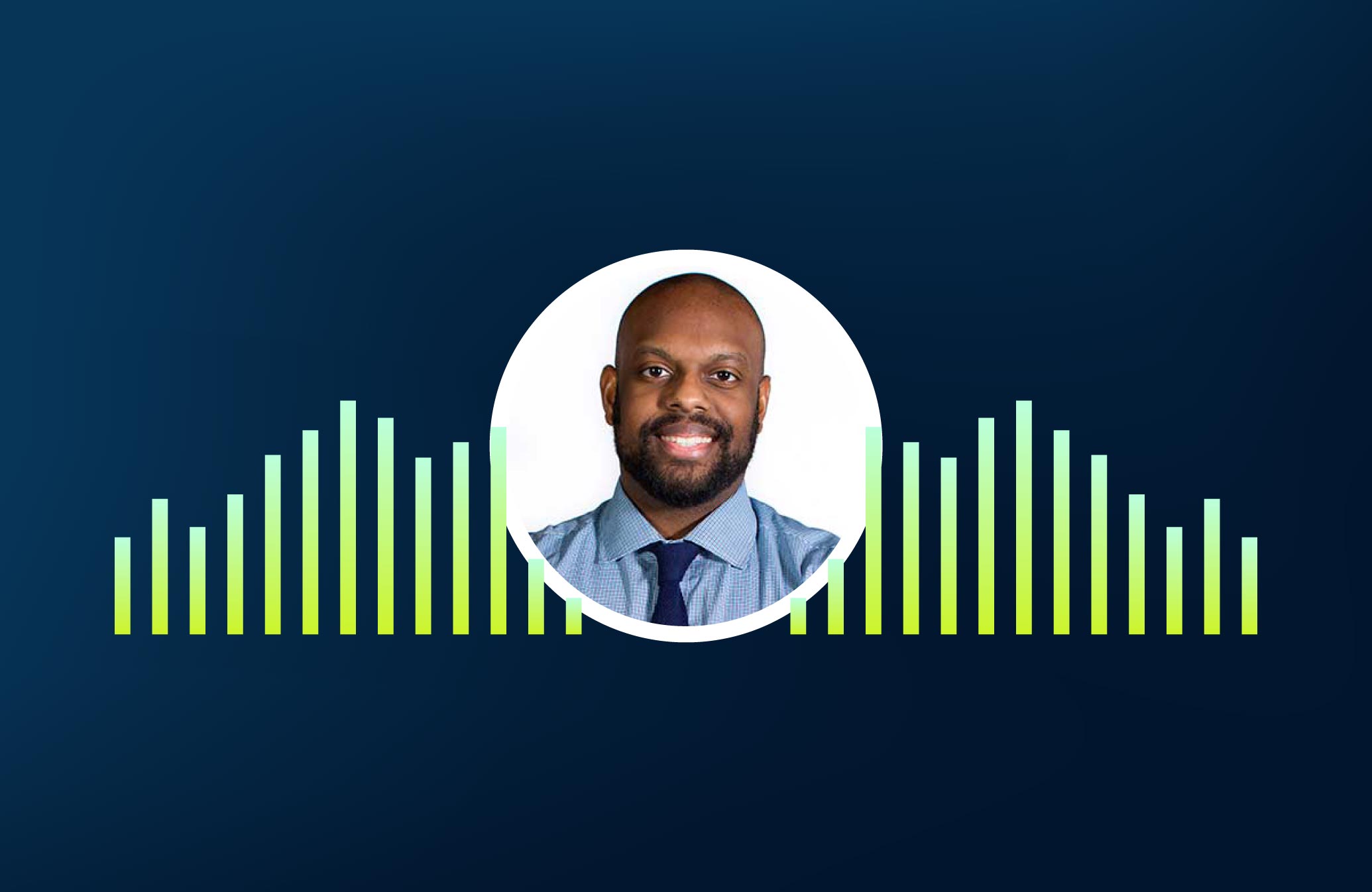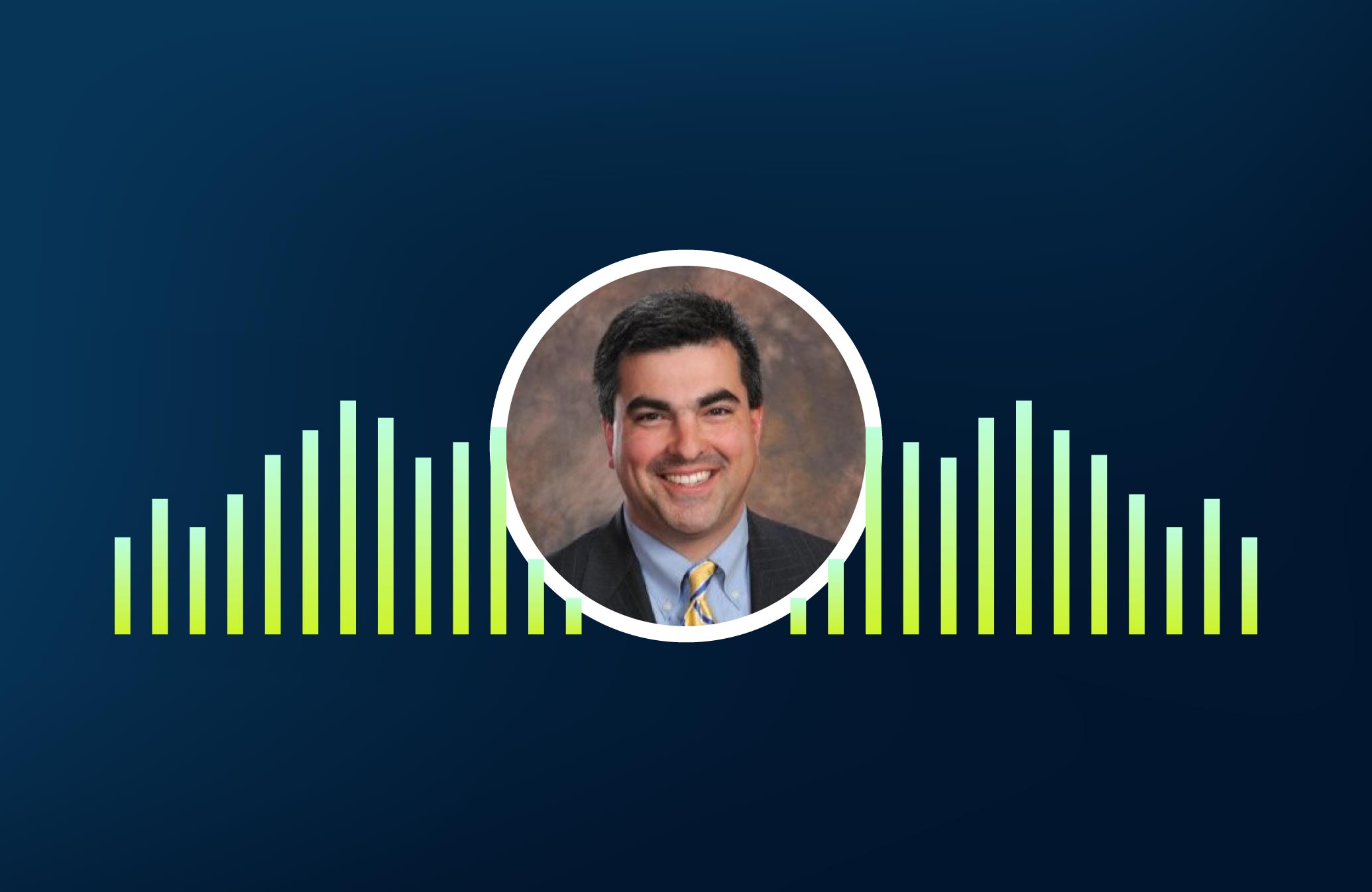Listen Now
Episode Transcript
Announcer [00:00:00] Welcome to RadioRev, podcasting from the heart of healthcare in Minneapolis, Minnesota. This is the podcast for change makers looking to do more than just health engagement. It’s about getting people to take action and do things that actually improve their health. It’s a radical idea, right? So we’re talking to the leaders, innovators, movers, and shakers who are bringing new ideas, inspiring others, and leading the way.
Jenn [00:00:27] Welcome to another episode of RadioRev. I’m Jenn Dellwo. Thank you for joining us for season two. This series of episodes dives deep into Social Determinants of Health, offering various viewpoints on the topic with a different industry expert each week with the hope that you take away new ideas, perspectives, and are inspired to look at SDoH in a new light from all angles. As a collective, the goal of these conversations is to inspire innovation and motivate the healthcare industry to work together to create meaningful solutions that help people live stronger, healthier lives. Today, we’re joined by Adaeze Enekwechi, President at IMPAQ. Adaeze, welcome to the show. Thank you so much for being here.
Adaeze [00:01:01] Thanks so much, Jenn.
Jenn [00:01:03] I’m excited for our conversation today. And the way I like to get started is to learn what your favorite ’80s song is.
Adaeze [00:01:10] I have to think about this because there are a lot of songs, and I couldn’t settle on one. Maybe that’s not a shock. But “Suddenly” by Billy Ocean. “Time after Time” by Cyndi Lauper is a song I still love. Whitney Houston’s “How Will I Know?” There were too many to choose from. So I just stuck with three. {music plays}
Jenn [00:01:45] That’s perfect. It’s a tough decision. It might be the toughest question we talk about today. Well, once again, thanks so much for being here. Why don’t we start by you telling us a little bit about yourself, a bit about your background, and how you came to IMPAQ?
Adaeze [00:02:00] Sure. I am a researcher at heart. I trained as a health services researcher at the University of Iowa. I am also a policy geek and have been into public policy probably since I was quite young, in high school. And somehow, I’ve been lucky enough to marry those two interests. So right now I lead as President an organization that really focuses on policy research, implementation, and analytics. And that’s what we do here at IMPAQ. We focus mostly on health, some human services work, international development, workforce solutions, workforce innovation, and of course, advanced analytics. That’s sort of a high-level overview. IMPAQ, by the way, is a 400-person company. $100 million just in terms of size. We’re based here in the D.C. area. We have a D.C. office and are headquartered in Columbia, Maryland. But we also have offices in Seattle, Oakland, and in Boston. It’s a great group of people. And I think we’re able to bring a whole slew of resources to bear on the problems our clients are facing.
Adaeze [00:03:21] A little bit about me, I am a mother of two, a working mom. Like a lot of people, I’m finding it a challenge to balance the two. Somehow, I managed to add a puppy to the mix. He’s so cute. I can’t not have him. So we’re just working through it and fitting everything in the 24-hour day.
Jenn [00:03:47] What kind of dog is it?
Adaeze [00:03:49] It’s a Corgi.
Jenn [00:03:50] Oh, Corgis are the best. So I’d like to hear a little bit more about IMPAQ in the work that you’re doing. What are some of the goals of the organization?
Adaeze [00:04:02] So, I’ve already mentioned we’re a policy research firm. We do a lot of implementation for some of the most innovative experiments, if you will, that the government has undertaken in policy and payment reform or delivery system reform. IMPAQ is really at the forefront of some of those. So if you think about the work that the Innovation Center is leading in trying to figure out how to better care for individuals with end-stage renal disease or chronic kidney disease, we have been at the forefront of some of that work. These are complicated projects, sort of bringing the ACO concept into some of the most complex—some of those patients have some of the most complex needs in the Medicare program. There are a lot of other programs that we’re involved in. For example, the evaluation of the rural community hospital program or payment program, seeing how that is working. How is it that we’re actually adequately caring for Medicare beneficiaries in some of those rural settings? We’re involved in the Bundled Payments for Care Initiative, just to say a few. What we do, though, cuts across these categories or even the types of work We do evaluation, learning and diffusion implementation, and sometimes just straight research, trying to really get an understanding of what the evidence says or building the evidence ourselves. That’s what I find to be very interesting about the work that we do at IMPAQ. We’re able to ask a lot of questions, answer them, sometimes help our federal clients, that’s the bulk of our client base, implement complicated demonstrations, or answer tough questions as the federal government continues to refine its mission, and payment reform and delivery system reform.
Jenn [00:06:10] Yeah, that’s great. Thanks for sharing that. So today we’re here to talk about Social Determinants of Health, and this is kind of a two-pronged question. But in your view, why is addressing them so important right now? It’s certainly not a new thing, but why the intense focus right now or maybe the appearance of an intense focus?
Adaeze [00:06:31] So, you know, I think you hit the nail on the head. This is not a new subject. When I was in graduate school, that’s when I started the deep study of Social Determinants of Health. That was part of my doctoral training. And deep study means you have to get a thorough grounding in the literature. And this literature is about 100 years old. It’s a century old. In fact, I think it was in 1965, one of the researchers at the time said we should basically stop asking the question of whether Social Determinants of Health affect health. The answer is unequivocally yes. So as of 1965, there were calls for people to stop asking the question and just start doing something about it. So your assertion that there is an appearance of focus is true, because I think it sort of lay dormant as more of an academic exercise for a number of decades. In 2002, however, one of the larger, more impactful studies, at least in my field, that came out of the then-named Institute of Medicine, was called “Unequal Treatment,” and there’s a subtitle there. But it highlighted the role of Social Determinants of Health and essentially unequal treatment when we interact with the healthcare system. That study sort of exposed huge gaps in the healthcare system that we were not meeting, and that I think they posited that if we were to address some of these social factors, we would see huge differences and changes in health outcomes that we were all at that time starting to measure in a more disciplined way. So it’s been around for a while. It has gained heightened status, increased status, among health systems and in health policy circles. So there’s a little bit more of a focus by practitioners, if you will. So academics have been doing it for a while. Practitioners, I think, have now more recently sort of understood, or begun to understand, that in the new system where you’re accountable for the care of a whole patient, you’re being held accountable for how individuals do when you see them over an episode of care, I think that just led to people paying a little bit more attention to what happens to their patients once they leave the four walls of the hospital. And what they found, I think when people started to poke around is they were astounded at what housing shortfalls looked like, what transportation limitations can do to people’s ability to access care or come to their appointments, what the lack of financial resources could do to people’s access to drugs or any other care that’s not covered by insurance, what the lack of insurance could mean for people’s access, especially in states where, perhaps Medicaid was not expanded. And I think less so, but I think increasingly, as more people speak out about it, is when you have structural racism, housing policies that have deprived people of adequate housing and everything else that comes with just living a normal life with dignity, that tends to build up over time. And the first place you tend to see it is in the health system. People don’t just present with, you know, high blood pressure. They present with high blood pressure that’s a result of years of stress and a whole host of other things that then gets exacerbated by socioeconomic needs that are just simply not met. So that’s why I think we’re starting to hear more about it. And people who are more on the practice side of healthcare have started to try to think about what we could do to address some of these socioeconomic gaps, economic and social demographic gaps.
Jenn [00:11:05] Yeah, that makes a lot of sense. So based on your background, what are some of the government programs and policies that challenged the Social Determinants of Health discussion?
Adaeze [00:11:17] We see some, more recently. I think folks in the government who have thought about this or who have some expertise in this area have to scratch their heads for a number of years as to how to actually do this. When you think about funding, funding streams tend to be pretty discrete. Healthcare dollars are supposed to go to healthcare and not go to food. Healthcare dollars are supposed to go to hospital or outpatient care or post-acute care settings and not necessarily go to housing, right? And Medicaid’s dollars cannot pay for housing, so you have a lot of these entrenched constraints into how we use dollars. So I think government programs that really break down some of those constraints we’re yet to see. But we have started to see a couple, like in the Medicare Advantage program a couple of years ago, there was guidance that allowed MA plans to address social factors with some of their dollars that they get from the federal government. So you started to see some plans experiment with or at least price into their bids, options where they provide meals, say, through Meals on Wheels, for food-insecure seniors, or home support. They started with some lower-hanging fruit options because it was easy to quantify. They could do them in a measured way and then see how they could expand. So we started to see them in the MA program. You have some states that are doing some interesting things, like North Carolina, where there’s an effort, for example, to take into account the living situation for, women, or some men, under domestic violence in this sort of domestic violence setting. Just to account for that as you take care of people in healthcare settings. You have large nongovernment, but large health systems have really started to put some dollars toward addressing things like housing. So Kaiser Permanente, through some of its social impact investments, is really trying to look at housing, $200 million worth of investments and resources to go toward addressing housing for homeless members.
Adaeze [00:13:44] You have places like Intermountain or ProMedica or MetroHealth where you can get a prescription from a doctor for food if after taking a look at the patient, listening to everything that could go wrong, if they identify and screen one of the challenges as being food insecure, you can literally get a script for food and walk across the hall and get as much food as has been prescribed on an ongoing basis. So we’re starting to see attempts at this. I think what we’re yet to see is, say, training of clinical staff around things like implicit bias so that you try to treat people differently when it’s called for or not treat them differently when that’s uncalled for. Make sure women get the same treatment for a cardiac event as men. Make sure African-American women are listened to if they complain about pain. There’s a whole host of things that we’re yet to see that are more that human, person-to-person level that can have equally devastating effects on health outcomes. But I think in terms of the community, we’re starting to see some changes, but certainly not enough. We’re just at the tip of the iceberg here.
Jenn [00:14:58] Yeah, and you gave a lot of really great examples of organizations and plans that are doing new things and doing great work. But are there any that you think are leading the way in addressing SDoH?
Adaeze [00:15:12] I hesitate to call anyone out as leading the way. I think a lot of good is happening, but this is actually still quite new in that health plan/payer/health systems space. I feel like this side of the healthcare industry has just recently caught on. If you remember, I said we’ve got 100 years of research that’s been looking at this for quite some time. So there are a lot of missing pieces still, I think, before we start to see anyone hitting it out of the ballpark. We have to get to a place where data and information systems are talking seamlessly to each other so that when you screen somebody the next provider that they have to interact with can have that at the ready. A community-based organization will have exactly the right data that they may need from a hospital system. And quite frankly, vice versa. Or if you do get a screen and get a referral for some community-based organization, it’s seamless in terms of your being able to access those services. Or if someone is not in a position to access services, how does the system then access them? How does a hospital system or community-based organization find them? So we’re very far from that. And I think until we have some of those key elements talking to each other, it’s hard to say that any one group is hitting it out of the park.
Jenn [00:16:50] Right. So once we can break down those silos and create a more streamlined communication process, then we can really get to work.
Adaeze [00:16:57] Absolutely.
Jenn [00:16:59] So you mentioned this, or you touched on it, but in January, you co-wrote an article for Health Affairs titled “It’s Time to Address the Role of Implicit Bias Within Health Care Delivery.” Can you tell me a little bit more about that article?
Adaeze [00:17:12] This is a paper that I think just speaks to what was called out in that 2002 report that I mentioned, put out by the IOM. But after that, that topic sort of went away. And that’s this notion that people of color and other minorities can experience significant bias within the healthcare system. That can have a terrible effect on their experience with the healthcare system. It could lead to some people go through abuse, lack of care, just generally poor judgments about how they are cared for. It increases their stress, obviously. It increases distrust of healthcare providers. It certainly increases noncompliance with any sort of therapeutic regimen. So what we basically said in that paper is implicit bias is a real thing. So while we’re talking about healthcare disparities or healthcare equity, or in this case more specifically Social Determinants of Health, we actually can’t afford to carve that out and act like that’s a nonissue. We have to consider yes, housing, yes, transportation, yes, home supports if that’s what’s at issue. But also look within the healthcare system to make sure that when people do interact with clinicians, providers, nurses, doctors, that they are being treated with the respect and the dignity that they deserve, because that’s actually where a lot of those changes and screenings and diagnoses occur. People will not feel secure to tell you what they lack if they don’t trust you. And if you mistreat them, a bad problem can only just get worse over time.
Jenn [00:19:04] Was there anything that inspired you to participate in writing this article?
Adaeze [00:19:09] I speak at a number of different events. I present quite a bit on a number of issues, and I happened to be at one particular event, and it was on Social Determinants of Health, a lot of wonderful experts. But as I looked up the list of panelists who were speaking, very few of them looked like me. Clearly, people were sort of talking as researchers or, I don’t want to say talking heads, but folks who had not necessarily done the research but are interested in the topic. There was almost no one with lived experience, certainly that they spoke to. But I was standing there with another colleague who had some lived experience, and somehow, we just sort of looked at each other in this quiet room. And I said you look angry. And he said, “I am.” He said, “You look kind of irritated, too.” And I said, “I am,” and I told him why. And we commiserated then and there quietly. We were whispering, and he said, “We have to write this up because who else will? Let’s just look at this entire day of speakers. Who else will write this up?” And that’s how the paper—it had just been percolating in my head for a long time. As I listened to person after person present and talk about Social Determinants of Health in this sort of dispassionate way because, you know, I have had terrible experiences, at least one major terrible experience in a healthcare setting. And it had nothing to do with the fact that I’m a healthcare professional, or I have a certain number of degrees. I think people just treat you differently if you’re black or if you’re a woman. There are certain assumptions that could be made that will lead to bad outcomes.
Jenn [00:20:53] And there’s a lot to be said for—you can do as much research on a topic as you want, but real-life experience is…you can feel stories so much more effectively.
Adaeze [00:21:05] Yes. Yes, it does. And I think for those of us who are in a position to have had some lived experience, as well as be in a position to speak or write about these topics, it is really incumbent upon us to make sure that some of those perspectives are represented in the literature or in discourse settings around town.
Jenn [00:21:31] Now that the article has been out for a while, what has the response been?
Adaeze [00:21:36] Well, you know, I’ve learned from some folks that just because you write something doesn’t mean it’s going to change the world. I mean, I learned that from The Washington Post and The New York Times. I’m a health writer. My job is to write and put it out if I can. I gave a couple of examples. Obviously, I was one of them. I was a co-author. But a couple of the examples spoke to an experience by one of the authors, and people immediately figured it was me because I’m the woman of the two. And I got some texts with just, the shock. People were shocked that such a thing could happen because they see me in town, and it doesn’t seem like someone like me would go through something like that. But you know, when you’re in a hospital, there’s no PhD tattooed on your forehead. The place where you work is not the first thing they’re thinking about.
Jenn [00:22:32] They don’t have your resume in front of them.
Adaeze [00:22:35] Nobody has your resume in front of them. So, you’re going to be treated as a person. And so how that happens often depends on how the position that you’re interacting with treats you. I mean, Serena Williams, I think, she had a terrible experience while having a baby. And she’s known by everybody pretty much in the world. She still had a terrible experience. And I think that actually fueled a lot of discussion. If someone like Serena Williams could go through something like this while having a baby, can you imagine what a regular, unknown African-American woman goes through? So the feedback was, I think, people just want to be appreciated. Reading something like that was a helpful reminder. And we’ll just see. Just lots of talk, lots of interest. Others who do research in this space texted me or emailed me saying, “This is fantastic. It’s hard to break through with that in this noisy space of Social Determinants of Health at the moment.”
Jenn [00:23:48] Right. And some people, you know, try and avoid topics like that because it makes them feel uncomfortable, because there clearly is a problem and there are things that we need to be doing to be better. And I’m wondering what you think healthcare is missing when it comes to addressing social determinants, and what we can do first to all get on the same page.
Adaeze [00:24:13] I think there are a couple of things. There’s a lot missing. We have a lot going for us. I don’t want to sound like Debbie Downer here. We have a lot going for us. A lot. Many things go well. But I do think that in public policy one of my observations is that often the folks writing the policy, or designing it, or just discussing it haven’t really experienced the effects of those policies themselves. So, for example, if we’re going to address transportation by handing everybody an Uber voucher or Lift voucher, without really talking to the people who will either work with those vouchers to try to get them to a medical appointment or who will have to use that intervention, so to speak, to address a problem, you can easily miss the gap because then you don’t know what other true underlying factors could be. So in the healthcare space we often miss people who have experienced what it is that we’re trying to solve. That can lead to a lack of empathy sometimes. People just have no idea. They’re not empathetic. They don’t see themselves and the people that they’re talking about. And so there’s just this big disconnect. In fact, that’s the best word. I often find there’s a big disconnect between the people talking and doing and the people who are affected. The extent to which we can bridge that, I think, will go a long way in helping us have better targeted solutions to some of this stuff. I think another issue I would raise, there are many, but you find that ROI, the return on investment, is usually the first question that some leaders will ask. What’s the ROI if we invest in making sure that our patients have access to nutritious food? And one of my colleagues said this best. He’s an emergency physician. In fact, he’s the one I wrote the article with. He said, “As an emergency physician, I can do about 10,000 things—prescribe, do, issue about 10,000 things for which there is not a single study that demonstrates ROI. But all of those things are paid for within the healthcare system.” So it’s only convenient that it’s when it comes to questions like this, Social Determinants of Health. What are we going to do about housing? All of a sudden everybody wants to see the ROI. But on the million different tests that he can order, imaging that he can order, drugs—well, maybe less so drugs, but perhaps drugs, depending on the condition if you’re prescribing it for something that it’s really indicated for—but there’s no return on investment. There’s no study saying that there’s hard evidence that this thing is going to work, and yet we do it. So we’ve been very selective, I think, in asking when there’s a return on investment. And that isn’t because there’s no return on investment when it comes to Social Determinants of Health. It’s just I think what often hampers that discussion is that people don’t see their return as being yielded to them. So if you are in the health system, and you invest in nutrition and the person is healthy and they do well, chances are they might move. Or they’ll get a different employer and therefore their doctor will be affiliated with a different health system. And you would lose the ability to recoup the benefits of having that healthier patient. So if people think that way, it breaks down before anything actually happens when it comes to Social Determinants of Health. We don’t have a system where people see that as just a benefit, period—a huge return on investment, period. We still look at it very much in a parsimonious way.
Jenn [00:28:29] Yeah, that makes a lot of sense. Well, to wrap up. Thank you so much for your time today. But personally, what’s the coolest thing you’ve done lately?
Adaeze [00:28:38] Oh, well, besides get a dog, which is probably not cool, I went parasailing over the Pacific a couple of months ago. That was a lot of fun. It was scary just to lift off, but once I got in the air with a 350-foot-long rope, it was it was really amazing.
Jenn [00:29:02] I love that. That sounds so fun. Well, thank you so much for your time today. If people would like to connect with you, what’s the best way they can get in touch?
Adaeze [00:29:11] Oh, I think I’m getting better at Twitter. But, you know, LinkedIn is probably best. I’m on LinkedIn. You can always email me, too.
Jenn [00:29:19] Okay, great. Well, again, thank you so much for your time.
Adaeze [00:29:22] Thank you, Jenn.
Announcer [00:29:24] Thanks for joining us for the RadioRev podcast brought to you by Icario. If you found today’s conversation as informative and energizing as we did, please take a moment and subscribe to the podcast. As always, we invite you to learn more about us and check out all of our content at dev-revel-health.pantheonsite.io/RadioRev.
Inside the Episode
In this episode, Adaeze Enekwechi, PhD, MPP, President at IMPAQ joins the show to discuss the importance of lived experience when talking about social determinants of health. We discuss government programs and policies that challenge SDoH, innovative solutions that stand out, and where we’re headed as an industry. Questions Adaeze addresses include:
- Why addressing social determinants is so important right now
- The role of implicit bias within healthcare delivery
- What healthcare is missing when it comes to addressing SDoH
To keep the conversation with Adaeze going, connect with her on LinkedIn.
“Implicit bias is a real thing. We have to look within the healthcare system to make sure that when people do interact with clinicians, providers, nurses, doctors, that they are being treated with the respect and the dignity that they deserve, because that’s actually where a lot of those changes and screenings and diagnoses occur.”

Adaeze Enekwechi, PhD, MPP
President at IMPAQ
Can’t get enough of RadioRev?
We’ve got an entire season dedicated to social determinants of health to keep you inspired! Listen to the next episode in the series for another new perspective on SDoH.




